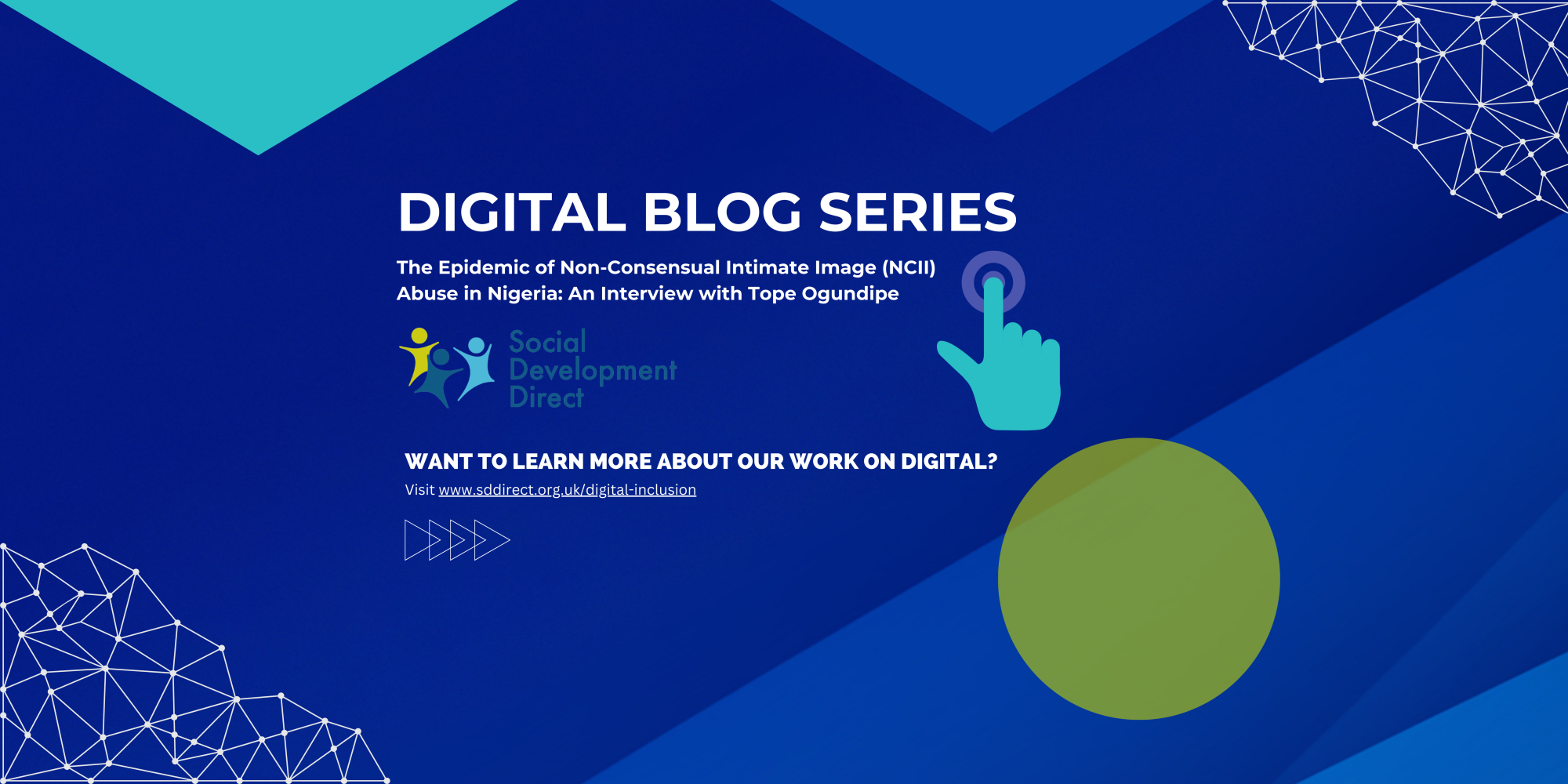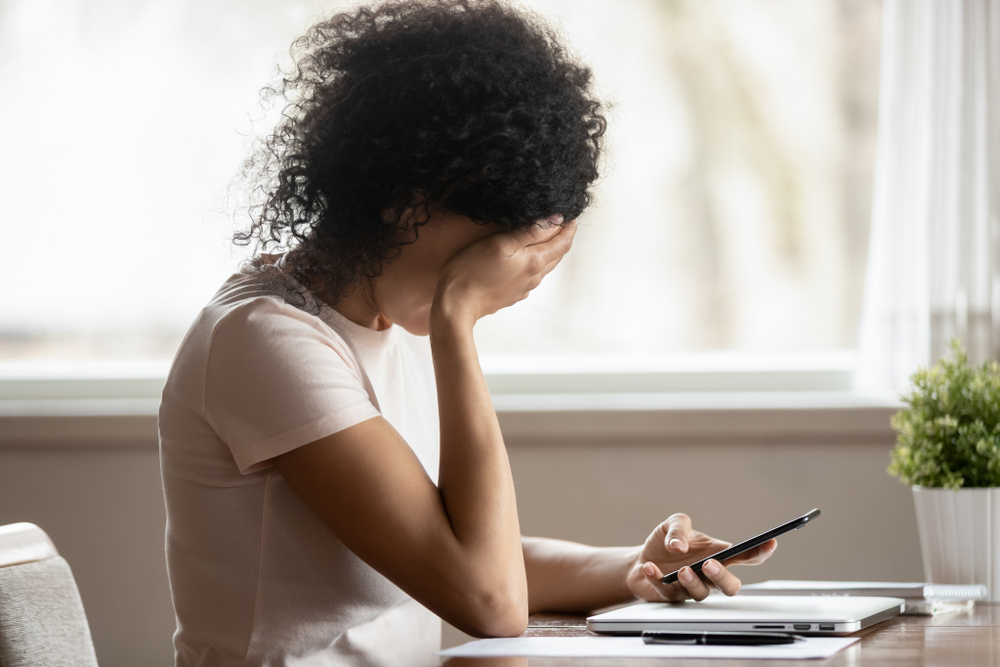
![]()
By Onyeka Nneli
Ever found yourself lost in the daily whirlwind of X (formerly Twitter)? Well, so have I. However, amid the usual banter and memes, there is a disquieting trend that cannot be ignored. Non-consensual intimate image abuse (NCII) has sadly become an all-too-common sight on social media platforms.
NCII is a global problem but it is particularly on the rise in low- and middle-income countries. As these countries become increasingly digitised, their citizens are increasingly at risk of either experiencing NCII directly or being exposed to it.
SDDirect’s Associate, Tope Ogundipe, CEO of TechSocietal Consulting, is a key player in the digital privacy space in the Nigeria. She recently co-published research on the problem of NCII in Nigeria. I sat down with her to learn more.

Question: How often are intimate images of women and vulnerable groups shared online without consent in Nigeria?
Tope: There are no national statistics available on this topic. However, our organisation conducted research to understand the psychological impact of NCII abuse on victims/survivors in Nigeria. Our survey revealed that 75% of respondents had experienced online gender-based violence (GBV), nearly 30% reporting image-based sexual abuse. In focus group discussions, seven out of ten girls shared personal experiences of NCII or knew someone who had experienced it, indicating it is very common. Perpetrators are often ex-partners who obtained the intimate images during their previous relationships.
Question: Are any specific people at particular risk of NCII?
Tope: In Nigeria, women, girls, LGBTQI+ and people with disabilities are typically more at risk of online harassment, discrimination, and other forms of digital abuse. In addition to them being targets of abuse, they may also lack awareness about privacy risks and technical skills, which increases the risks they face.
Question: What laws and policies relate to NCII in Nigeria?
Tope: The right to privacy in Nigeria is protected in Section 37 of The Constitution of the Federal Republic of Nigeria along with the Nigerian Data Protection Act (2023) and the Cybercrimes Act (2015). Additionally, the draft Regulation on Internet Intermediaries (2022) mandates platforms to remove non-consensual sexual images within 48 hours of upload.
Question: What are people’s experiences when reporting NCII to the police?
Tope: In my experience, people reporting NCII to the Nigerian police encounter challenges such as victim/survivor blaming, disbelief, requests for money before investigations begin and insensitive questioning. The public also often condemns the survivors due to the widespread belief that they consented to the picture being taken or shared. All these factors make people hesitant to seek justice.
Question: On which social media platform is NCII more likely to occur?
Tope: We (TechSocietal) do not focus on any specific platform. We just strive to keep women safe across all digital platforms. NCII is more prevalent on social media platforms, messaging applications and in-app chats than on streaming platforms where it is nearly impossible. We find that most platforms take swift action against terror-related content, but they do not seem to prioritise the removal of NCII.
Question: Has there been any successful prosecution of an NCII abuse case in Nigeria?
Tope: Yes, there have been a few cases. Recently, there was a case in which the perpetrator was convicted and sentenced to two years’ imprisonment and fined N500,000 (approx. £490). However, there have also been cases in which there have been no prosecutions.
Question: What lessons can Nigeria learn from other countries?
Tope: I am not aware of any African countries that have effectively addressed NCII with specific legislation criminalising it and providing clear guidelines for prosecution. There is a need for stronger laws and implementation procedures, including reclassifying NCII abuse as a sexual offence rather than as the mere sharing of pornography. Nigeria could learn from countries with strong support systems, legal aid and safe spaces for survivors.
Personal reflections
I was aware that NCII abuse was a concern in Nigeria, but Tope’s interview and research revealed its shocking prevalence. In an increasingly digitised Nigerian society, women, girls, and vulnerable groups are consistently exposed to this crime. A stark example is the Kito phenomenon, where images and videos of LGBTQ+ individuals are exploited to facilitate blackmail, extortion and even kidnapping, and where survivors are unable to seek justice due to Nigeria’s stringent anti-homosexuality laws. This underscores the urgent need for stronger, more accessible laws protecting all citizens against NCII abuse and violence, irrespective of their sexual orientation.
Beyond legal reforms, it is important to consider NCII’s impact on mental health and to invest in robust support systems for survivors. By collectively addressing other aspects such as community engagement, government advocacy, education, and awareness, we can strive for a society that upholds the digital safety of every individual.
Further reading
- Global Partnership TFGBV Preliminary Landscape Analysis.pdf
- Image-Based Sexual Abuse in a Culturally Conservative Nigerian Society: Female Victims’ Narratives of Psychosocial Costs
- Virtual Violence: Cyberspace, misogyny and online abuse
- Silencing Women: Nonconsensual Distribution of Intimate Images As Gender-based Violence in Nigeria (Part I)
- Stop NCII